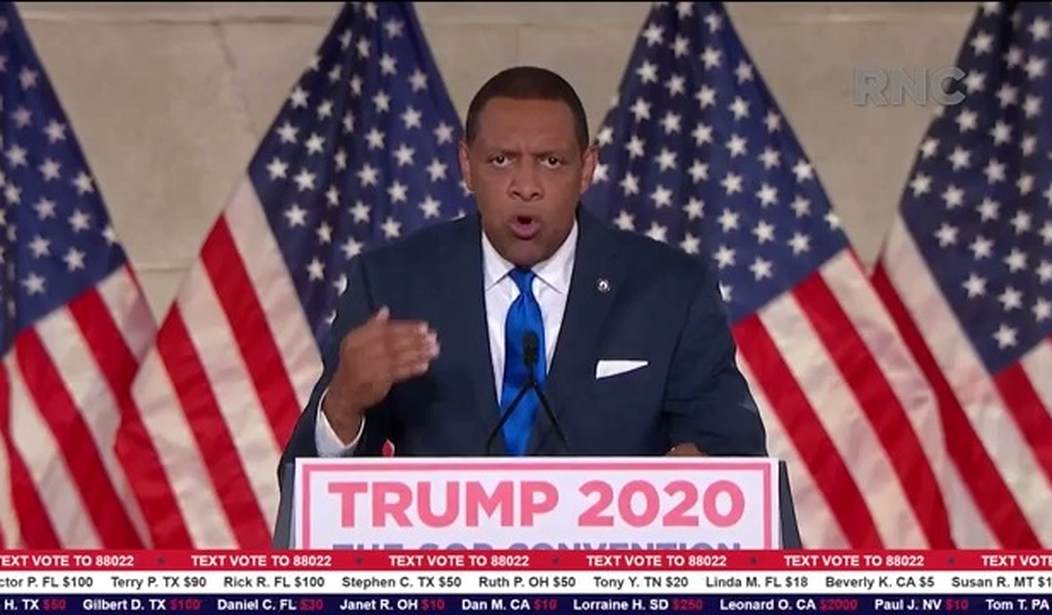You know the first two nights of the Republicans' virtual national convention have gone well when you see that Politico's morning Playbook leads with a lame joke about the U.S. Postal Service hiring a new lobbyist, aimed at reviving the post office non-scandal. Ho, ho, ho!
The more pertinent news is that both parties have adapted deftly to the virtual format. Democrats invented an amusing roll call procedure -- showing people from each state touting the party's virtues -- and Republicans even improved on it a little.
Democrats did a good job of highlighting Joe Biden's attractive personal qualities by showing people he's helped and comforted. Republicans showed President Donald Trump's attractive qualities -- he actually has some -- by showing him interacting with people, as he pardoned one reformed bank robber and swore in five new citizens.
The Republicans had the advantage of coming second, as the incumbent presidential party traditionally has, and they capitalized on it. The Democrats confidently assumed everyone shares their confidence that Trump is a racist and xenophobe, but his convention spotlighted Sen. Tim Scott, whose family "went from cotton to Congress in one lifetime," and former Gov. Nikki Haley, the daughter of Sikh immigrants from Punjab, India.
The message is that America is not permeated with "systemic racism," as The New York Times' 1619 Project would have you believe, but rather is a land of opportunity, even Haley's and Scott's South Carolina. And progress is possible -- and happening. Scott holds the seat held for 35 years by segregationist "Cotton Ed" Smith.
Recommended
Another contrast: Democrats had their virtual sessions introduced by Hollywood figures, one of whom somehow got the idea it would be funny to mispronounce the vice president's one-syllable surname. Republicans interspersed their first two sessions with ordinary people from target states who have come to strongly support Trump.
There may be some demographic groups who value the insights of Hollywood figures with multimillion-dollar mansions in Bel Air or Brentwood. But probably more voters will be swayed by the pro-Trump testimony of lobsterman Jason Joyce of Swan's Island; dairy farmer Cris Peterson of Grantsburg, Wisconsin; and trucker Geno DiFabio of Youngstown, Ohio.
What goes unmentioned is sometimes as important as what's mentioned. Viewers of the Democrats' virtual proceedings heard much less about abortion than viewers of the Democrats' more conventional conventions, even though it's an issue that, according to dial groups, helped Democrats in previous presidential and VP debates.
One reason is Democrats have moved way left on the issue. Joe Biden has abandoned four decades of opposing government-funded abortions. And Democratic legislators have delighted in passing laws authorizing abortions in all nine months of pregnancy.
Republicans' Tuesday speakers included former Planned Parenthood clinic head Abby Johnson, who provided "pretty graphic" descriptions of abortion procedures. The best a squirming Washington Post "fact-checker" could do, as National Review's Ramesh Ponnuru noted, was to argue that there aren't that many (actually, several thousand yearly) post-viability abortions.
Left utterly unmentioned by the Democrats was the continued violence and the sharp increase of murders in major cities across the country -- Portland and Seattle, Minneapolis and Washington, Chicago and New York -- and in smaller places such as Kenosha, Wisconsin.
Democrats may hope that friends in the "mainstream media" (libeled MAGA hat-wearing teen Nicholas Sandmann's term) will continue to shield viewers from uncomfortable footage of rioting, assaults and arson, as it's been doing. They may hope people won't notice that reports describing "mostly peaceful" demonstrations are given standing in front of raging fires, or that CNN yanked a chyron from the screen and deleted the adjective "violent" before the noun "protest," or that The New York Times wrote that peaceful marches "gave way to fires and destruction."
The broadcast networks and cable also-rans MSNBC and CNN obviously hope that viewers won't notice horrifying damage that reflects badly on the partly Marxist-led Black Lives Matter movement or the Biden-Harris campaign. They had some basis for believing that covering up the news would work when, in the immediate aftermath of George Floyd's May 25 death, polls showed most voters supporting Black Lives Matter and being sympathetic to its argument that American policing is "systemically racist." But current polling, after nearly three months of violence and destruction, and rising murder rates, shows less support for de-policing cities large and small.
In 2016, Democrats were smugly confident, until 9 p.m. Eastern on election night, that demographics would guarantee them victory. This year, they've been confident that Donald Trump's low job approval and COVID-19 and the lockdown's economic devastation will do the same, even with extreme stands Bill Clinton in his prime would have shunned.
Maybe so. But maybe not. This week, Trump's Republicans are having their say.
Michael Barone is a senior political analyst for the Washington Examiner, resident fellow at the American Enterprise Institute and longtime co-author of The Almanac of American Politics.
























Join the conversation as a VIP Member